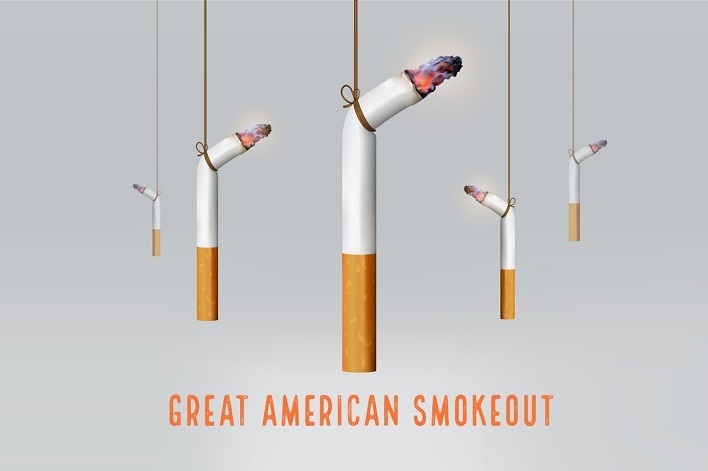By Maria Jauhar, M.D.
For ourselves, a loved one, an organization, a workplace, or even a circle of friends, the greatest step forward, the greatest gift, the greatest service we can do is to stop smoking cigarettes.
Smoking is the most ferocious, merciless threat we face. No type of warfare, no terrorist threat takes so many lives. Hands down, smoking is still the number one cause of premature death in the United States. It is the largest single cause of preventable disease. It damages nearly every organ of the body. And it is an addiction, which means that stopping is not easy.
It Begins with a Single Day
Like the process of smoking cessation itself, the Great American Smokeout began with a single day. In 1970, the residents of Randolph, Massachusetts, were challenged to put down their cigarettes for one day and donate the money saved to a local high school. In 1974, a Don’t Smoke Day was promoted in Monticello, Minnesota. And in 1976, the California division of the American Cancer Society promoted the first Smokeout, prompting nearly one million smokers there to quit for a day.
Now observed each year on the third Thursday of November, the Great American Smokeout is credited with hastening the spread of smoke-free public spaces. The attention and information that resulted from the Smokeout encouraged public officials to adopt regulations that recognize smoking for what it truly is, a serious threat to public health and well-being.
The Hidden Danger of Progress
Complacency may be the next great hurdle in further reducing the danger to our society of smoking. People who can remember “before” are becoming senior citizens. The days when somebody was smoking everywhere you went are not even a memory to the young people most in danger of beginning. As a result, the Center for Disease Control and Prevention estimates that 3,200 Americans under the age of 18 begin smoking every day. Another 2,100 young adults who have smoked occasionally become daily smokers – every day.
As a result, one in 13 Americans aged 17 or younger will die prematurely from a smoking-related illness if the current rate of smoking continues.
People with Help Do Better
Because smoking is an addiction, quitting is a kind of recovery. So although there are “cold turkey” examples among the acquaintances of many of us, just stopping is not the norm. Smoking cessation for the vast majority of persons takes effort, resources and a bit of outside help.
Research confirms it. According to the American Cancer Society, studies show that people most likely to succeed in quitting cigarettes use two or more of these assists to get the upper hand:
- Telephone smoking-cessation hotlines
- Stop-smoking groups
- Online quit groups
- Counseling
- Nicotine replacement products
- Prescription medicine to lessen cravings
- Guide books
- Encouragement and support from friends and family members
Many people succeed after more than one attempt to quit, so it is important to keep trying. Judging ourselves harshly, or accepting “failure,” can lead us down the road of disease and death.
We’d be happy to help. To make a support plan for your own new smoke-free life, schedule an appointment by calling 912.897.6832 or use our online appointment request form.





